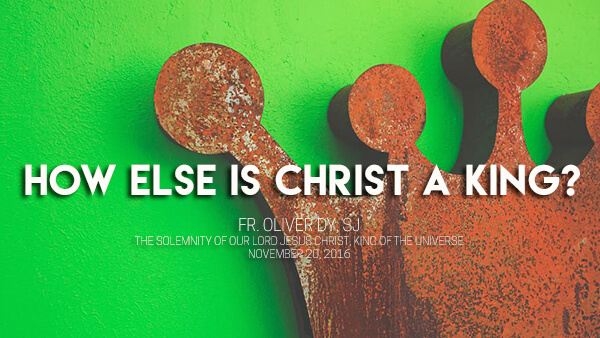


Fr. Oliver Dy, SJ
The Solemnity of Our Lord Jesus Christ, King of the Universe
November 20, 2016
If one searches the Gospels, one would perhaps be surprised to find that Jesus never actually ascribed title “king” to himself. It is was rather imputed to him by others . Among many others in the Gospel narratives, the word was uttered by those sincerely searching for the truth from the shrewd politician Herod: “Where is the newborn king of the Jews?” (Mt. 2:2). It is also part of a clause of mockery: “Hail, King of the Jews!” (Jn. 19:3); and again: “If you are King of the Jews, save yourself” (Lk. 23:37). The word “king” not only remains spoken, but becomes it visible its Hebrew, Greek, and Latin expression written upon the order of Pontius Pilate (Jn 19:19): “Jesus the Nazorean, the King of the Jews” in the English translation. In this case, a criminal’s placard, which is part of the punitive spectacle of fear designed to subjugate a rebellious public at the expense of a humiliated crucified sinner – becomes a key revelatory site of the Lord. In all cases described above, the word “king” come from foreigners who do not strictly share the Jewish faith of the disciples of Jesus: on the one hand, the saintly magi from the East; and on the other, the Roman soldiers occupying Jerusalem, and Pontius Pilate who is incidentally remembered whenever Christians profess the Apostle’s Creed.
These contrasting types of characters in the Gospels provoke the question: is there really anyone – however sinful and however ignorant or in denial of being sinful – outside the scope of the kingship of Christ? Is there even a scope, a limit, a boundary, to begin with in speaking of the divine king’s embrace of human beings and the rest of conscious animated reality? One can further stretch the logic to anything: is there really any event or occurrence in human history, be it individual or collective, that lies outside God’s governance? With a little more imagination, go back further at the boundary point of the very creation of time and space: are these not also part of the rule of eternal and infinite divine?
How else is Christ a king? The first reading contains an allegorical reference to the divine shepherding: “You shall shepherd my people Israel” (2 Sam. 5:2). The crown of Jesus the king, even as copies the human display of powers and rights of lesser kings, symbolizes how much the King truly treasures the sheep. The more complete quality is pointed out in the second reading: the ability of the king to plunge into the same situation of vulnerability of the defenseless in a world where victimization and violence, even in subtle forms, is typical.
If I wish this King to rule over us, let us simply gaze at the crucified One. Even in the most tragic volatilities and vicissitudes in the unfolding of political history, the silence of the suffering King instructs as much as it draws and comforts. We only need speak and put our trust in one line when all is apparently lost: “Jesus, remember me.”